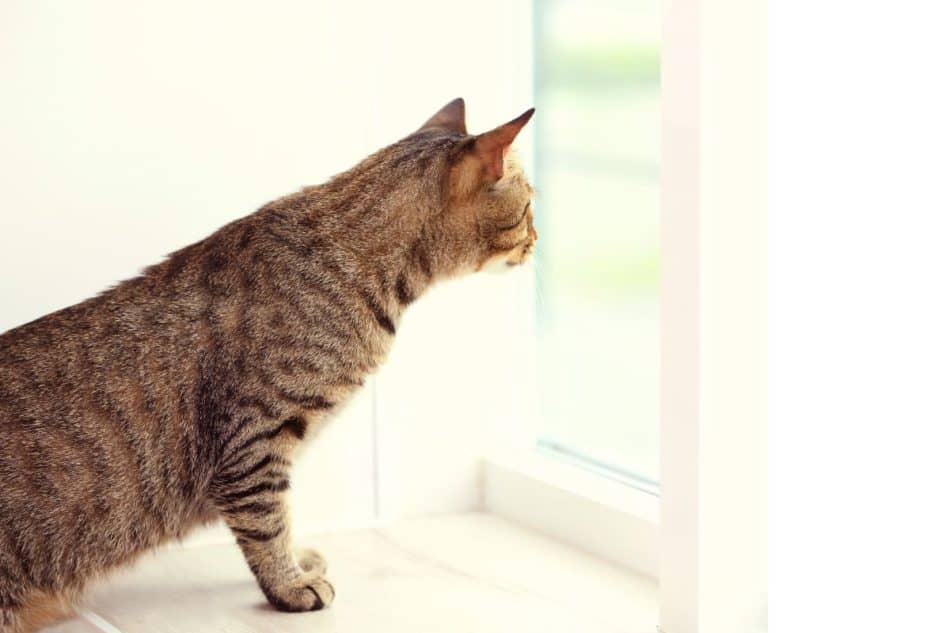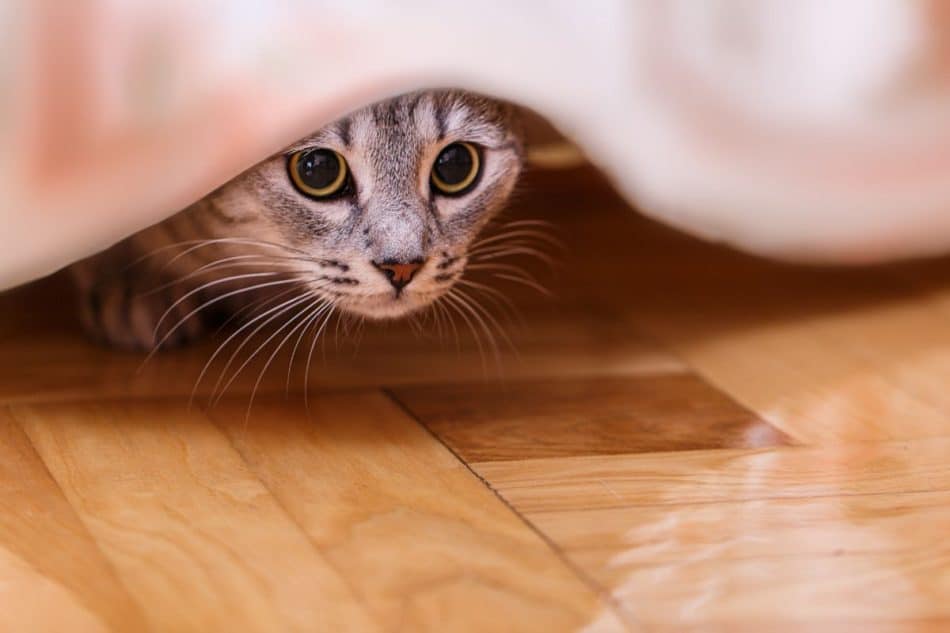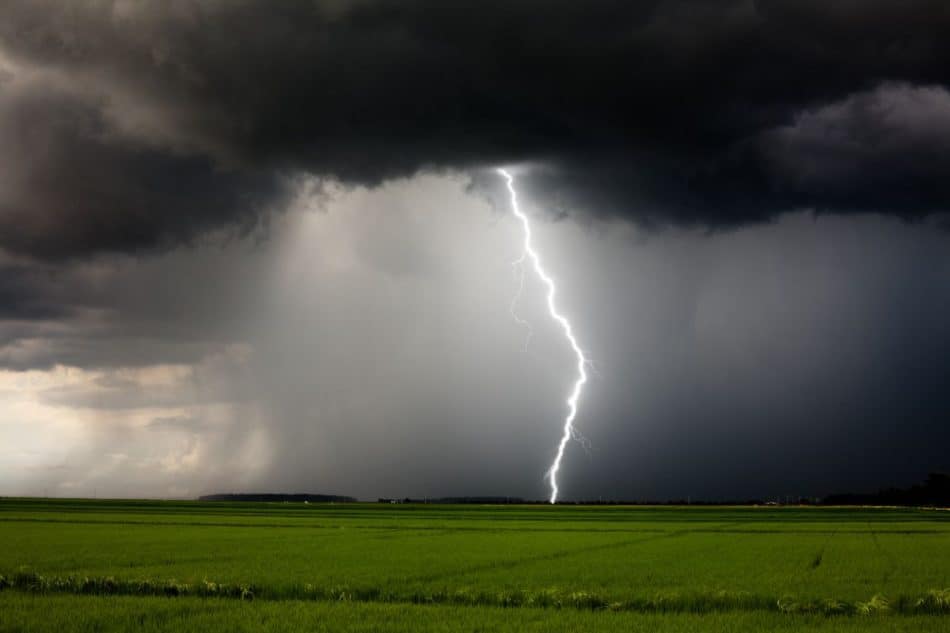Table of Contents
Are Cats Psychic About the Weather?
Having lived with many cats, I often wondered If they might possess some mysterious intelligence that we cannot see or understand. I don’t claim to have the answer to that question, but they sure seem to be able to know things in a way that is completely beyond my comprehension.
And as far as thunderstorms are concerned, out cats always seemed to know when one was coming.
Maybe they are favored with some kind of ancient wisdom.
Let me share a quote about animals from the book The Outermost House by Henry Beston:
“…..they move finished and complete, gifted with extensions of the senses we have lost or never attained, living by voices we shall never hear.”
Of course in addition to their mystical wisdom, there may also be some logical explanations. Read on to explore at least three of those.
3 Ways Your Cat May Know a Storm is Coming
1. Their Excellent Hearing
Your cat may hear thunder in the distance, even though you may not be able to hear it. And your kitty has probably learned that distant thunder will soon become loud thunder. Cats hate loud noises like thunder, so there very well may be a change in the behavior of your pet.
You have probably noticed your cat apparently hearing something and you don’t hear a thing.
Cats hear sounds we do not hear. They have a very broad range of hearing frequency, particularly in the higher pitches. Their auditory range is among the best of all mammals.[1]
It also may be somewhat helpful that they can twitch their ears around so as to hear a little better.
They also seem to be able to stop whatever they are doing and focus on what it is that has grabbed their attention. If they could, I think they would tell us to be quiet so they could listen more effectively.
2. Their Smelling Ability
Humans have 5 million odor sensors in their nose, whereas cats have about 200 million.[2] Since cats can smell much better than we can, they might smell the rain sooner than we could.
You have probably noticed the smell of rain yourself. It may be difficult to describe, but it is something that accompanies a rainstorm, and you know it when you smell it.
The smell of an approaching storm may be a result of ozone being released into the air by lightning and carried by the wind in your direction.
There is also an odor called petrichor, which can be a result of bacteria called actinomycetes being released from the soil by the falling rain.
Another contributor to petrichor may be volatile oils called stearic acid and palmitic acid, which are released by the rain hitting certain plants.[3]
So with all that, it would not be surprising if your cat is able to smell rain on the way.
Why Does My Cat Sniff Everything? is my blog post that will give you more information on your cat’s ability to smell very very well.
3. Their Inner Ear
Storms are basically a low barometric pressure weather system[4] and your cat may be able to tell when the atmospheric pressure is dropping by sensing it in their inner ear.
We humans and our cats have something called the vestibular system, of which the inner ear is a part. [5] This vestibular system may allow our cats to sense changes in barometric pressure.
Your kitty is probably quite capable of associating that barometric change with previous thunderstorms. Low pressure may be a signal that loud noises will follow.
An interesting side-note: Thomas Jefferson purchased a barometer when he was in Philadelphia for the adoption of the Declaration of Independence.[6] I guess he didn’t have a cat.
What Will My Indoor Cat Do When a Storm Approaches?
Your cat may initially go on high alert with ears perked up and eyes fixed on the outside.

When the thunder gets loud, many cats will then tend to hide.

This is why it is important to have some good hiding places available for your kitty, and my blog post Should I Give My Cat Places to Hide? will help you with that.
Some cats may not be bothered all that much, but I personally never met a cat that was not upset by loud noises such as thunder. Thunder and lightning can be very scary.

You might also want to close blinds and curtains to block out the sight of lightning flashes.
Also, make yourself available in case your kitty wants to hang out with you. A little affection here couldn’t hurt. Your assurance that all is well may be of comfort to your cat.
You can also find ways to calm your cat when you visit another blog post of mine: How to Relax Your Cat.
Folklore About Cats Predicting the Weather
In 373 BC a Greek historian named Thucydides reported that “rats, dogs, snakes, and weasels” left the city of Helice a few days before an earthquake struck.[7]
It has long been thought that animals could sense the arrival of storms and other natural disasters.
There is some truth to this belief, but there is also a lot of folklore that does not pass the test of logic or scientific examination. and falls into the category of superstition.
Just for fun, let’s look at some of the rather absurd folklore that is related to cats.
Before the 1890 establishment of the U. S. Weather Bureau, which later became the National Weather Service, meteorological observation and forecasting was done by the U. S. Army Signal Service.
In the early 1880’s, Army Lieutenant H. H. C. Dunwoody was directed by the Signal Service commander to compile a collection of weather proverbs. This collection was published in 1883.[8]
Among the proverbs related to cats, we find these which I have selected to share with you:
“When cats sneeze it is a sign of rain.”
“When cats are snoring foul weather follows.”
“When cats are washing themselves fair weather follows.”
“Cats with their tail up and hair apparently electrified indicates approaching wind.”
Now of course these proverbs should be looked upon with a very skeptical attitude, but they do reflect the interest over many years in cats’ alleged ability to predict the weather.
For More Cat Information
See my blog post Living With Your Cat
References:
[1] R. S. Heffner, H. E. Heffner, Hearing range of the domestic cat, National Library of Medicine, 1985
[2] Cummings School of Veterinary Medicine at Tufts University, Respect your Cat’s Sense of Smell, the Catnip newsletter, 09/19/2022
[3] Elizabeth Peterson, Why Does Rain Smell Good?, LiveScience, 06/03/2022
[4] American Geosciences Institute, Why is the weather different in high and low-pressure areas?
[5] Cornell Feline Health Center at Cornell University, Vestibular Syndrome,
[6] National Weather Service, History of the National Weather Service
[7] Matt Kaplan, When animals predict earthquakes, NewScientist 02/14/2007
[8] H. H. C. Dunwoody, Weather Proverbs, available on Google Books
